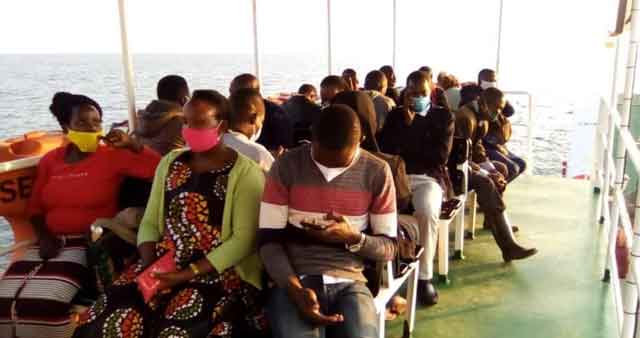
Kalangala, Uganda | THE INDEPENDENT | Travellers using the Entebbe–Kalangala Road are spending more than six hours on the road and high transport costs. This follows the halting of operations of MV Kalangala.
MV Kalangala that plies the Entebbe – Kalangala route suspended its operations in February this year to undergo its annual maintenance done in Mwanza, Tanzania.
However, the vessel returned in May and has remained grounded at Port Alice, in Nakiwogo because the docking piers are still being upgraded.
The old piers got submerged by water levels on Lake Victoria, which increased drastically from 12 meters in October 2019 to 13.48 meters in May 2020, the highest level ever recorded in 50 years.
This meant that travellers have to spend more time on the Kampala – Masaka road and 140,000 Shillings on transport to access the Islands.
Before the operations of MV-Kalangala were halted, travellers were spending less than 90,000 Shillings and about 5 hours from Kampala to Kalangala via Entebbe. MV Kalangala charges 10,000 Shillings and 14,000 Shillings per trip for ordinary and second class passengers respectively while other canoes and boats charge shillings 35,000 per trip.
However, the shortest trip on the water is operated by private speed boats (MV Vanessa and MV Nathalie) that take one and a half hours.
The two vessels charge passengers 35,000 Shillings for a single trip to Kalangala and 70,000 Shillings for a return journey during the week. The vessel also charges 45,000 Shillings for a one-way ticket and 85,000 Shillings for a return journey on weekends.
All the water vessels dock at Lutoboka landing site, which is less than 2 kilometres from Kalangala town.
Richard Mutebi, the chairperson Kalangala-Masaka stage, says that few people travel to and from either district due to high transport costs. The taxi fares increased from 15,000 Shillings to 30,000 Shillings since they carry only half of their normal capacity to maintain social distancing following the outbreak of COVID-19.
As a result, each driver and conductor work twice a week and only four taxis operate daily to ensure everyone earns an income amidst the low number of passengers.
Mutebi, however, notes that he has not met any passenger who has travelled from Entebbe to Kalangala via Masaka in the recent past.
It is not only the transport costs and long hours that characterise the journey. The road is also in a deplorable state. Some sections of the road have been tarmacked, while the other sections are very dusty and filled with potholes, affecting traffic flow.
Due to the poor state of the road, the journey took over an hour, and as a result, the taxi arrived at Bukakata landing site five minutes past 4 pm. MV Pearl had already set off.
This meant that the taxi and passengers had hope that the taxi would be loaded onto MV Ssese.
The two ferries make five trips a day starting at 7 am, 8 am, 10 am, 12 pm, 4 pm and 5 pm from either Bukakata or Luku (Bugoma) landing site in Kalangala.
Fortunately, there was only one truck at Bukakata landing site. However, by the time MV Ssese docked at Bukakata at 4:30 pm, 18 more vehicles had joined the queue.
The trip commenced at 5 pm and lasted 30 minutes. Once at Luku, the passengers boarded the taxi and set off for 35km stretch to Kalangala town. The trip took an hour and fifteen minutes because of the several potholes and also offloading cargo for disembarking passengers.
The taxi arrived in Kalangala town close to 7 pm. The road trip lasted more than six hours.
The return journey took close to seven hours including the waiting time at various points.
Daniel Kikoola, the Resident District Commissioner for Kalangala, says the road trip via Masaka is unpopular because it is both exhausting and time-wasting compared to water vessels.
********
URN
 The Independent Uganda: You get the Truth we Pay the Price
The Independent Uganda: You get the Truth we Pay the Price


